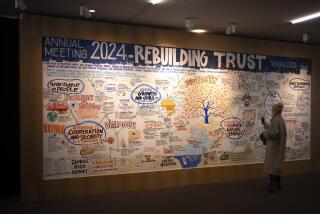Meet Globalization’s Doubters Partway
- Share via
There’s no shortage of fear, loathing and even hysteria about economic globalization these days. That’s especially true in academe; many who toil there believe its hurricane force will in the end leave the world’s poor twisting in the wind.
Some academicians flatly view globalization as an ethical and moral menace. University of Exeter Prof. Timothy Gorringe, in his new book “Fair Shares: Ethics and the Global Economy,” says globalization has “the potential for destroying society.” His metaphors are of sickness: “clearly feverish,” “a symptom of an illness,” “a disorder of the soul.”
Others view globalization as a masked process for putting false gods in clandestine charge of our lives. Harvard Prof. Dani Rodrik writes in the new book “Making Openness Work” that it “requires too much blind faith in markets to believe that the global allocation of resources is enhanced by the twenty-something-year-olds in London who move hundreds of millions of dollars around the globe in a matter of an instant.”
Still others fear globalization as the hit man against hope. Former Economist magazine researcher Harry Shutt, in his recent book “The Trouble With Capitalism,” compares it to “organized crime--a parasite so vicious that it is killing the body it feeds off.”
That’s all a bit much, of course, for a comparatively new force on the planet whose effects are only slowly becoming apparent, much less fully understood. Still, a measure of hysteria may not be such a bad thing, given globalization’s seeming inevitability. At bottom all that scholarly advice can be boiled down to an old bromide: Prepare for the worst, hope for the best. Does a more integrated world economy add to the wealth of nations so that the resultant rising tide lifts all boats? Or do the rich merely become even richer, buying new yachts and leaving the world’s poor in their wake?
Economists tend to say that their craft is only about money, not ethics or justice. But sages as far back as Aristotle and up to today’s egalitarian ethicists, especially the great Harvard philosopher John Rawls, have always insisted that at the heart of injustice one inevitably finds greed, preying like a cancer on justice.
To many of us in the West, this line of thought can seem like little more than microwaved Marxism. But not in the Third World. Referring to the stomach-wrenching downdrafts in less wealthy economies, Egyptian President Hosni Mubarak said recently: “In the emerging world, there is a bitter sentiment of injustice. There’s a sense that there must be something wrong with a system that wipes out years of hard-won development because of changes in market sentiment. Years of progress are gone, because of developments elsewhere.”
The answer to the Mubaraks of the world is not to make the obvious point that in their exaggeration they wind up playing mainly to the soccer stands, but to figure out which parts of their anti-globalization message are valid. To fail to do that is to put at risk the valuable internationalizing power of globalization.
In a recent speech, the eloquent U.N. Secretary-General Kofi Annan said: National markets are held together by shared values and confidence in certain minimum standards. But in the new global market, people do not yet have that confidence.” Annan concluded that until widespread confidence in globalization is instilled, the world economy will be vulnerable to the broadside backlashes of protectionism, excessive nationalism and ethnic chauvinism.
Annan is right: The West should be more open--and therefore a lot less dismissive of Third World laments. Rather than indicting the Mubaraks for provincialism, why not make a point of meeting these outspoken leaders more than halfway? Profit and economic growth surely are not the only social values advanced by the developed world. Why not offer a large spirit, an open mind, new ideas for managing change, especially with regard to the world’s swirling capital markets? For, if something more than dismissiveness is not forthcoming, fears about the potential ravages of globalization will divide the world into those who believe and those who hatefully do not. That could herald a new ideological war that could bring out the worst in us all.
More to Read
Sign up for our Book Club newsletter
Get the latest news, events and more from the Los Angeles Times Book Club, and help us get L.A. reading and talking.
You may occasionally receive promotional content from the Los Angeles Times.










